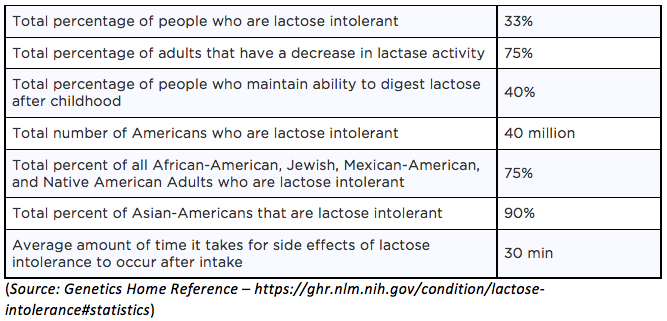Lactose intolerance is defined as the inability to digest lactose, the sugar found in milk, causing gastrointestinal disturbances. The National Institutes of Health (NIH) report that about 65 percent of the global population has a reduced ability to digest lactose after infancy. Since the United States Department of Agriculture (USDA) estimates that the average American consumed 646 pounds of dairy products in 2016, with milk accounting for nearly a quarter of that total, that can be some seriously saddening news for many.
So, what’s the culprit that causes our body to become lactose intolerant as we get older? Gaurav Arora, M.D., gastroenterologist and physician on the medical staffs at Texas Health Denton and Denton Digestive Care, a Texas Health Physicians Group practice, says it’s an enzyme called lactase, or lack thereof. Lactase breaks down lactose into simpler forms called glucose and galactose. These forms are a lot less harsh on our digestive system and can be easily absorbed into the bloodstream. But in those who have reduced or no lactase enzymes, lactose doesn’t break down before entering the colon. Once it hits the colon, bacteria break down the lactose and create excess gas and fluid.

Even though all adults experience a decline in lactase enzymes as they age, genetic makeup has a lot to do with how quickly the decline proceeds. Some ethnic groups are more prone than others. The most common ethnicities reported by the NIH to experience lactose intolerance in adulthood are people of Arab, East Asian, Greek, Italian, Jewish and West African descent.
An injury to your small intestine can also play a powerful role in lactose intolerance. This includes surgery, radiation, infection or disease. Although less likely in developed countries like the United States, drinking poorly treated or untreated water can also cause injury to your small intestine that could result in intolerance.
Since digestive disturbances caused by a lactose intolerance can mimic symptoms of more serious gastrointestinal issues, like Irritable Bowel Syndrome (IBS) or Irritable Bowel Disorder (IBS), Arora says it’s important to know the difference.
“If someone has unintentional weight loss, persistent or severe abdominal pain, nausea or vomiting, persistent or severe diarrhea, or blood in the stool, these may be signs of something more serious than just a food or dairy intolerance,” he says. “IBS is not a serious disorder but can severely impact the quality of life and may be initially hard to distinguish from a food or dairy intolerance.”
Common symptoms of a dairy intolerance include:
- Diarrhea or loose stools (more common in children)
- Nausea, and sometimes, vomiting
- Abdominal cramps in the lower belly
- Bloating
- Gas
- Gurgling or rumbling sounds in the lower belly
It’s important to keep in mind that symptoms arise mostly after consuming dairy products. If you exhibit symptoms listed above without having consumed dairy, keep track of your symptoms and your dairy intake and make an appointment with your doctor if the symptoms persist despite your lack of dairy consumption.
If you suspect that you or a loved one might have a lactose intolerance, Arora says you should first try to avoid all milk and dairy products for one week. If symptoms lessen or go away, then dairy is most likely the culprit for why you’ve been feeling uncomfortable.
“Make sure to read the labels on everything you eat,” Arora says. “Milk or lactose is sometimes added to foods you might not suspect, such as cereal, instant soups, and salad dressings. Check the ingredient list of foods for anything that might suggest lactose. Look for these words: ‘milk,’ ‘milk byproducts,’ ‘dry milk powder,’ and ‘dry milk solids.’ Also look for ‘lactose,’ or ‘whey’.”
After a period of dietary restriction, Arora says working with your doctor to test your limits can help you reintroduce some dairy products back into your diet.
“Lactose may be better tolerated if consumed daily rather than intermittently,” he explains. “The highest concentration of lactose per serving is found in milk and ice cream, but ice cream is typically better tolerated than milk because of the high-fat content that slows its emptying by the stomach.”
The cheese lovers out there can rejoice a little bit, as well, since Arora adds that cheeses are much better tolerated than milk in many cases.
If you suspect that you or a loved one might be suffering from an undiagnosed lactose intolerance, Arora says it’s always best to discuss your concerns with your doctor who can help prescribe medications or supplements to manage symptoms or refer you to a specialist like a gastroenterologist to help you manage the disease.
Finding a specialist doesn’t have to be complicated! Use Texas Health Resource’s “Find-a-Physician” tool to find a physician near you that accepts your insurance and fits your needs, or call 1-877-THR-WELL (1-877-847-9355).

